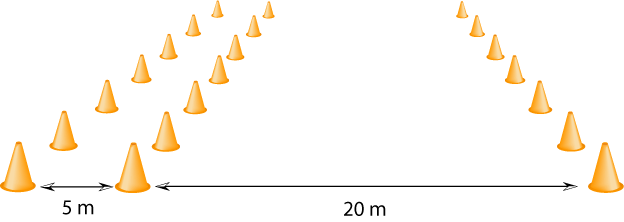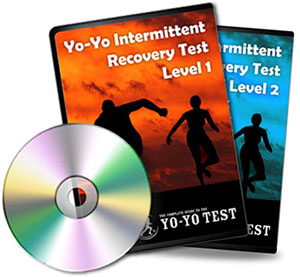The Yo-Yo Intermittent Tests are similar to the Yo-Yo Endurance Test (a variation of the beep test), except in the intermittent tests the participants have a short active break (5 and 10 seconds for the intermittent endurance and intermittent recovery test, respectively). There are two versions of each Yo-Yo Intermittent Test, a beginners Level 1 and advanced level 2 (see details of the speeds and levels for the Yo-Yo Intermittent Recovery Test and Yo-Yo Intermittent Endurance Test). The Yo-Yo tests can be performed using the Team BeepTest software.
test purpose: The test evaluates an individual's ability to repeatedly perform intervals over a prolonged period, particularly for athletes from sports such as tennis, team handball, basketball and soccer or similar sports.
equipment required: Flat, non-slip surface, marking cones, measuring tape, pre-recorded audio cd or mp3 (buy or use the Team BeepTest software), cd player, recording sheets.
pre-test: Explain the test procedures to the subject. Perform screening of health risks and obtain informed consent. Prepare forms and record basic information such as age, height, body weight, gender, test conditions. Measure and mark out the test area. Perform an appropriate warm-up. See more details of pre-test procedures.

test layout: Use cones to mark out three lines as per the diagram above; 20 meters and 2.5 (endurance test) or 5 meters (recovery test) apart.
procedure: The subject starts on or behind the middle line, and begins running 20 m when instructed by the cd. The subject turns and returns to the starting point when signaled by the recorded beep. There is an active recovery period (5 and 10 seconds respectively for the endurance and recovery versions of the test) interjected between every 20 meter (out and back) shuttle, during which the subject must walk or jog around the other cone and return to the starting point. A warning is given when the subject does not complete a successful out and back shuttle in the allocated time, the subject is removed the next time they do not complete a successful shuttle. (see video example)
variations: for each of the recovery and endurance intermittent tests there are two levels: level 1 designed for lesser trained individuals and level 2 aimed at well trained and elite athletes and starting at a faster speed. Both test variations have increasing speeds throughout the test. See the Yo-Yo Intermittent Test Table for more details.
scoring: The athlete's score is the total distance covered before they were unable to keep up with the recording. The Yo-Yo intermittent test usually takes between 6-20 minutes for level 1 and between 2-10 minutes for level 2. For more details see the speeds and distances for the Yo-Yo Intermittent Recovery Test and Yo-Yo Intermittent Endurance Test. There has been formula published for estimating VO2max (ml/min/kg) from the Yo-Yo IR1 and IR2 test results (Bangsbo et al. 2008):
Yo-Yo IR1 test: VO2max (ml/min/kg) = IR1 distance (m) × 0.0084 + 36.4
Yo-Yo IR2 test: VO2max (ml/min/kg) = IR2 distance (m) × 0.0136 + 45.3
target population: The yo-yo intermittent test was developed specifically for soccer players, though it is suitable for similar sports teams which are intermittent in nature. The level 1 test is designed for recreational level players, while the level 2 test is for elite soccer players. The test is not suitable for populations in which a maximal exercise test would be contraindicated.
reliability: Test reliability would depend on how strictly the test is run, and the previous practise allowed for the participants.
advantages: Large groups can perform this test all at once for minimal costs.
disadvantages: Practice and motivation levels can influence the score attained, and the scoring of when a person is out of the test can be subjective. As the test is usually conducted outside, the environmental conditions can also affect the results. The test cd must be purchased.
other considerations: This test is a maximal test, which requires a reasonable level of fitness. It is not recommended for recreational athletes or people with health problems, injuries or low fitness levels. You may not have power where you want to conduct this test. If so, you need to ensure that the batteries of the audio player are fully charged.
comments: This test was developed by the Danish soccer physiologist Jens Bangsbo and his colleagues.
references:
- Original description of the test: Fitness Training in Football, a scientific approach - by Jens Bangsbo, publisher August Krogh Institute - Copenhagen University (December 1994).
- Krustrup, P., Mohr, M., Amstrup, T., Rysgaard, T., Johansen, J., Steensberg, A., Redersen, P, K., Bangsbo, J. (2003) The Yo-Yo Intermittent Recovery Test: Physiological Response, Reliability, and Validity. Medicine & Science in Sports & Exercise. 35(4), 697-705. This study found that the Yo-Yo Intermittent Recovery Test "had a high reproducibility and sensitivity, allowing for detailed analysis of the physical capacity of athletes in intermittent sports. Specifically, the Yo-Yo intermittent recovery test was a valid measure of fitness performance in soccer. During the test, the aerobic loading approached maximal values, and the anaerobic energy system was highly taxed. Additionally, the study suggests that fatigue during intense intermittent short-term exercise was unrelated to muscle CP, lactate, pH, and glycogen."
- Krustrup P, Mohr M, Nybo L, Jensen JM, Nielsen JJ, Bangsbo J. (2006) The Yo-Yo IR2 test: physiological response, reliability, and application to elite soccer. Medicine & Science in Sports & Exercise. Sep;38(9):1666-73. This study concluded that the "Yo-Yo IR2 test is reproducible and can be used to evaluate an athlete's ability to perform intense intermittent exercise with a high rate of aerobic and anaerobic energy turnover. Specifically, the Yo-Yo IR2 test was shown to be a sensitive tool to differentiate between intermittent exercise performance of soccer players in different seasonal periods and at different competitive levels and playing positions."
- Thomas, A., Dawson, B. & Goodman, C. (2006). The yo-yo test: reliability and association with a 20-m shuttle run and VO2max. International Journal of Sports Physiology and Performance, 2, 137-149.
- Jens Bangsbo, F. Marcello Iaia and Peter Krustrup, (2008) The Yo-Yo Intermittent Recovery Test: A Useful Tool for Evaluation of Physical Performance in Intermittent Sports, Sports Medicine 2008; 38 (1): 37-51.
Similar Tests
- Assistant Referee Intermittent Endurance Test — based on the Yo-Yo Intermittent Recovery Test (Level 2), involving forwards and sideways running.
- Dynamic Yo-Yo Test — a modified yo-yo test designed specifically for football referees
- The Yo-Yo Endurance Test — a continuous 20m shuttle run test similar to the beep test.
Related Pages
- Some Yo-Yo Test Results and Yo-Yo test norms
- Beep Test Software — provides the standard beep test and yoyo tests right on your PC or Laptop, with many additional features.
- Tables of the distance covered for each speed level for each level of the Yo-Yo Intermittent Recovery Test and Yo-Yo Intermittent Endurance Tests.
- Buying the yo-yo test
- The Yo-Yo Intermittent Test (Stage 2) is part of the Hockey SPARQ rating and the Soccer SPARQ rating
- See a video examples of Yo-Yo Tests being performed.
- About fitness testing for soccer
- The complete guide to the beep test for links to more information
- More Modified Beep Tests



 Current Events
Current Events